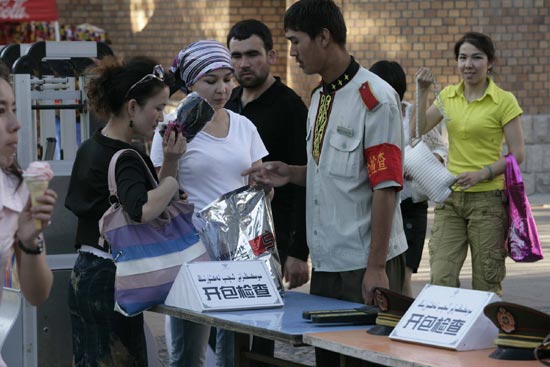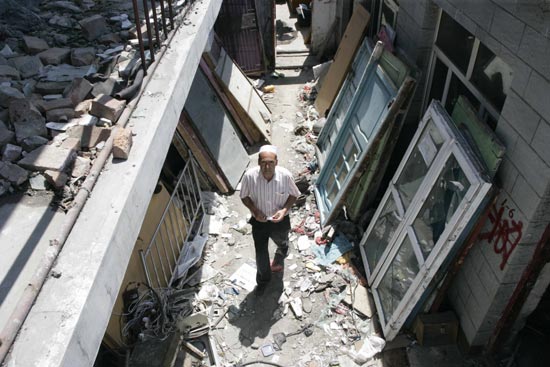Society
One year on, the pain still hurts
By Cui Jia (China Daily)
Updated: 2010-07-05 07:47
 |
Large Medium Small |
|
|
Wang Yang's last memory of his parents is standing over their bloodied bodies in the street outside their home in Urumqi, capital of the Xinjiang Uygur autonomous region.
His mother's last words to him had been: "Run home and hide."
"I was so scared that (July 5) night. The rioters were scarier than any monsters I know," said Wang at the SOS Children's International Village, where he has lived for almost a year.
When Wang arrived at the village, staff said he refused to talk. He believed the safest place was under the bed - the place his mother taught him to hide.
"He was obviously traumatized by the whole thing," said Yao Yiyun, who is now the boy's full-time guardian. "We all were."
After his parents were brutally beaten to death, Wang said he returned with neighbors to where he had seen them last. "I found them lying on the ground bleeding. I kept shaking them to wake them up but they didn't respond," he recalled, staring blankly into the distance.
Shaking his head, he said: "I really don't want to think about it any more."
Yao said that since the youngster has been at the village, he has been obsessed with just one question: Why did the rioters take his mother and father away? "I have no answer to that," she said.
Today, Wang is enjoying his new life at the village, which is home to children from eight ethnic groups, including Uygur, Han and Kazak, and says his ambition is to become a great painter.
"Although I still miss my parents badly, thanks to my new 'mum' (Yao) and my friends, who have all been so good to me, I'm not scared any more," he said.
One person who has helped a great deal with Wang's slow but gradual recovery is fellow orphan Abduwarz. "Abduwarz is my best friend because he always protects me," said Wang, who is almost inseparable from his Uygur classmate.
Despite the fact Uygurs killed his family, Wang said he feels no hatred towards the ethnic group.
"There is always good and bad people in any ethnic group," said Wang thoughtfully. "I know Abduwarz is good and the Uygurs who killed my parents are bad."
A total of 197 people were killed and more than 1,700 injured in Urumqi last July 5, when thousands of rioters took to the streets armed with knives, metal poles and bricks.
Following initial investigations, the Chinese authorities blamed separatists based overseas for orchestrating the unrest and suspended text messaging, international calling and Internet access. All services have been restored over the past year and life in the city has slowly returned to normal.
For Du Li, however, the horror of having to identify her 49-year-old husband's body at a police station 12 months ago is still as fresh in her mind as if it was yesterday.
"It's been one year now and all I want is to get my husband's mobile phone back," she said tearfully. "I want to see if he got the text messages I sent him warning not to go home (that night)."
Du had lived with her husband and 25-year-old son in Urumqi's Tianshan district, one of the areas worst affected in the riot, which is next to a shantytown built on the slopes of Heijia Mountain.
According to a report by the regional government, most of the rioters from southern Xinjiang, such as the Kashgar and Hotan prefectures, were unemployed migrants who had been living in 48 shantytowns across the city before July 5.
More than 21 percent of houses next to Heijia Mountain were not registered, while out of the 13,000 people who live there, about 72 percent are ethnic Uygur, said Tianshan district officials.
At the time of the riot, Du Li was in hospital recovering from an operation.
"My son was with me and I think we'd have been killed if we'd been at home. The situation was out of control," she said. "I called him hundreds of times and only got through at about 10 pm, but all I could hear was shouting and explosions. I couldn't hear his voice."
Du reported her husband missing the next day and was called to the district police station to look at some pictures of victims on July 8.
"I kept telling myself that he wouldn't be among them, that he must be in a hospital," she said. "My hope was shattered when I spotted the pink T-shirt I bought him not days before (the riot)."
Scared to return
|
|
Since the trauma of losing her husband, Du and her son have moved to live with her parents just a few lanes away from their old house. She said she fears a repeat of the violence.
"It was the scariest night of my life and the memory will follow me to my grave," said Du Yongshou, Du Li's father, who is in his 70s. Several people were killed and about a dozen vehicles torched on July 5 right outside his home, where he has lived since he was born.
"The regional government gave me 420,000 yuan ($62,000) in compensation on July 19 last year but I don't want money, I want my husband back," said Du Li. "I'd give them double to see my husband back in one piece."
The mother said she spent 30,000 yuan on her husband's funeral and used the rest to buy a flat on the other side of the city for her son.
"I have to be strong for my son. Our lives have to go on," she said. "One year on, I feel better but, like many, I am still scared."
To ease the fears after last year's riot, the regional authorities sped up the process of transferring the Uygur communities from the shantytowns and into modern residential zones. Decades-old buildings were demolished and new six-story blocks were constructed, with residents offered the choice of exchanging their homes for apartments or money.
Among those to make the move were Memet Mumin and his family, who traded their shoddy, mud-brick home on Heijia Mountain for a new apartment.
Instead of having to carry home drinking water in heavy plastic buckets, Memet, a sanitation worker in his 40s, said his family now has the benefit of running tap water. They can also cook using clean, natural gas rather than choke on the smoke from their old coal-fired oven.
Learning lessons
Following a year of constant patrols by armed police with guns and shields, residents in Urumqi have largely become used to tightened security measures in most neighborhoods.
"Their presence makes me feel safe but, at the same time, it also reminds me of the bloody riots," said taxi driver Zhan Haitao, 45.
It has been a year of growth for the city's public security forces, both in terms of resources and experience: While the government has upped the budget, officers have been learning the lessons of the riot to improve their ability in dealing with mass incidents.
"The July 5 riot exposed several security loopholes, such as our poor surveillance system, slow response and lack of coordination between different divisions," said Li Shenhui, chief director of the special police force under the Urumqi public security bureau.
About 10 million yuan has been allocated to the unit by the central government over the last 12 months, which has been used for training and recruitment, he said. The force now has 530 officers, 70 percent of whom are from ethnic groups other than Han.
"Ethnic officers communicate with local residents better and can be sent into ethnic areas undercover so we can obtain intelligence," explained the commander.
The unit has also been equipped with motorbikes so officers can get to troubled areas within minutes even in bad traffic conditions.
"Several central command centers have been set up around the city where commanders of the police, the armed police and the fire department work together to ensure better coordination and response when incidents happen," said Li.
A special team made up the force's best officers - Flying Tiger Squad - was also established in May to combat terrorism, as well as deal with hostage situations, gun attacks and explosions.
Xinjiang public security bureau has also recruited about 2,200 other officers since February to help prevent future unrest. Their duties mainly include routine street patrols, said Li.
Although security in the capital has been beefed up, staff at police bureaus in rural areas of Kashgar, where majority of rioters were from, say their units are still under-staffed.
Only 16 officers serve 40,000 people in Bulaksu township in Kashgar, where 25 people were ordered to return to from Urumqi due to their involvement in the riot, said Mehmut Emet, director of the township's police station.
"Our workload has become heavier after the riot because we have to closely monitor those sent back and make sure none of the villagers in the township cause such a trouble again," he said.
Yan Jie contributed to this story.






